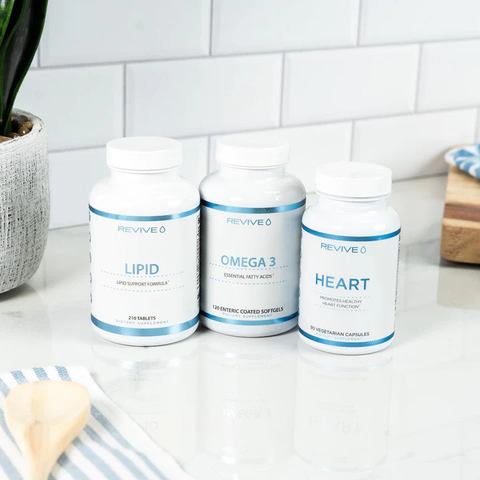How to Lower Cholesterol While on Testosterone Replacement Therapy
Approximately 1 in every 4 men over the age of 30 have low testosterone levels. There are likely many more who are never tested or seen and yet still experience significant side effects. One of the most common solutions for treating low testosterone is to go through testosterone replacement therapy or TRT. TRT provides a lot of great benefits, including the ability to increase testosterone levels and eliminate many of the effects of lower levels. However, TRT has also been known to dramatically increase unhealthy cholesterol levels.
It is important to be aware of the potential of TRT to affect your levels and take steps to be proactive and help manage your cholesterol levels at a healthier rate. In this guide, we will share some tips for how to lower cholesterol on TRT as well as some basic information about testosterone replacement therapy and high cholesterol levels.

What Exactly Is High Cholesterol?
Cholesterol is something that our bodies need, but the challenge is moderating good cholesterol vs. bad cholesterol and keeping the levels of those bad ones under control. There are two main types of cholesterol. Those are LDL and HDL. LDL is considered the bad cholesterol and elevated numbers can lead to the risk of things like high blood pressure, heart attack, cardiovascular disease, stroke, and more.
Heightened bad cholesterol paired with high triglycerides can be especially dangerous and lead to even higher risks of poor cardiovascular health and other serious issues. High cholesterol is hard to detect and primarily can only be found through a blood sample. If you are taking testosterone replacement therapy, you should work closely with your healthcare provider to track and manage these numbers and mitigate the risks associated with them.
High cholesterol can come from other things besides TRT as well. It’s simply important to be aware, understand where you are, and take action if your LDL levels are too high.
What Exactly Is Testosterone Replacement Therapy?
Testosterone is a natural hormone that is produced in both men and women. However, men have much higher levels of testosterone and need much higher amounts for their bodies. In men, testosterone levels help with these things:
- Facial and body hair
- Sperm production
- Sex drive
- Muscle mass and strength
- Fat distribution
- Bone density
- Red blood cells
Some men have a testosterone deficiency. It is also normal that as a man ages, their levels start to decline. The decline in testosterone often leads to health and body changes and may have adverse effects for some. One modern solution for handling this decline is TRT or testosterone replacement therapy.
When there are suspicions of low testosterone, a doctor can run a blood test to see where you are. It’s a good idea to run several tests and compare the numbers since they can fluctuate throughout the day.
Testosterone therapy can be given in different forms. The intent is to help supplement the testosterone you are losing or missing using certain therapy options. The different forms include gels, patches, injections, and implants. There are oral pills as well, but these are not used very often as they can harm the liver.
There are both risks and benefits to using TRT. Working with your doctor is the best way to determine if it’s a good option for you and which method you should try. For most who struggle with a lack of testosterone, they notice an improvement in things such as muscle mass, insulin, sex drive, energy, and more. Be familiar with the possible side effects and make an informed decision.
How to Lower Cholesterol on TRT
Now that you understand the basics of cholesterol and testosterone therapy, let’s look at some simple strategies that may help you naturally lower your cholesterol. There are several different approaches you can take.
Improve Your Diet
One of the best options for reducing and managing your cholesterol levels is to change your diet for the better. Chances are there are some foods you can reduce your intake of and maybe some foods that you can increase too. You want to be sure to focus on consuming more foods that have been shown to reduce LDL cholesterol. Here are a few recommendations.
- Foods rich in fiber (fruits, veggies, whole grains, legumes)
- Healthy fats (olive oil, avocado oil, nuts, fatty fish)
- Omega-3 fatty acids (salmon, mackerel, walnuts)
In addition, you should also focus on reducing your intake of saturated and trans fats. The food that has these the most are processed foods. Full-fat dairy products and red meat also contain higher levels of these fats. It’s ok to have some, but you want to limit your intake and minimize these foods in your diet. Find a way to enjoy them in moderation.
We know that Omega-3 fatty acids can significantly help reduce your LDL cholesterol levels. Those healthy fats and food rich in fiber will also help you manage your numbers. This doesn’t mean you can never have the unhealthy foods you enjoy. It just means that you should be aware and follow an 80/20 rule where you eat better 80% of the time.
Incorporate Regular Exercise
Exercise is good for everyone, not just those taking TRT. Technically speaking, we should all be working to incorporate exercise into our routines for optimal health. Perhaps you are already exercising. If you are, then you are already taking a positive step towards your health and controlling your cholesterol too.
If you are not exercising or maybe not exercising consistently, then it’s a great time to start. There are different recommendations for the level of exercise that you need and we are all different. If you struggle to exercise or it’s hard on your body, work with a professional to find the best solutions for your health. In general, you should strive to exercise about 30 minutes per day. If you can’t squeeze it in every day, that’s ok. Just make a point to exercise at least several days a week.
Exercise will help increase HDL cholesterol, which is a good kind. At the same time, it helps to remove LDL cholesterol from your bloodstream.
Strive to Manage Your Weight
Managing your weight is important for overall health too. Take note that many of these recommendations are great for overall health and they contribute to reducing cholesterol at the same time. Having an unhealthy weight is hard on our bodies. When you have excess weight, the extra body fat actually elevates both your LDL cholesterol and your triglyceride levels.
We know you can’t just drop all the extra pounds overnight. Losing weight can be very difficult. However, striving to reduce your weight and lose a modest amount of weight can go a long way to help. Every little bit counts. Being in a healthy range has so many benefits for your health and the improvement of your cholesterol is just one of them.
How you work to lose that weight is up to you. You can work with your provider a dietitian or even a trainer who can help you create a customized plan for weight loss and exercise. There are plenty of options to help you get started with your health journey.
Limit Smoking and Alcohol
Unfortunately, bad habits can come back to bite us. Both smoking and alcohol have been shown to increase your LDL levels, especially when you overconsume them. Whether you’re an avid drinker or a heavy smoker, these harm your body in more ways than one. Many of us don’t realize just how much havoc smoking and drinking can wreak on your body.
For example, when you drink a lot of alcohol, it can be hard on your health and it will raise triglycerides and LDL. This doesn’t mean you can never drink; it just means you should try to manage how much alcohol you consume. The general recommendation is that you don’t consume more than 1-2 drinks per day. If you can manage to stick to this range, you are far less likely to experience raised cholesterol from drinking.
When it comes to smoking, we know that this can have many adverse health effects on you. Smoking contributes to poor cholesterol health in more than one way. The first is that smoking raises your bad cholesterol and actually reduces your good cholesterol. This hurts on both sides. In addition to the direct effect on your cholesterol levels, smoking can also cause plaque buildup in your arteries and may put you at a higher risk of heart disease, heart attacks, strokes, coronary artery disease, and other similar issues.
Since high cholesterol also puts you at risk for these health issues, it is important to note that you may be exposing yourself to excessive risk.
Use Natural Supplements
There are many vitamins and heart health supplements that can help you better support your cholesterol levels without taking medication. Supplements like Omega-3, fish oil, Vitamin B12, Lipids, and heart-healthy supplements all help contribute to better cholesterol.
It’s a good idea to check with your healthcare provider before starting any supplements as you and your provider know your health history and tolerances the best.

Medication Management
While managing your cholesterol naturally is certainly the preferred method, some people may need medication to help. When your lifestyle and healthier living aren’t sufficient, your healthcare provider can prescribe certain medications that help to lower cholesterol. This will be up to you and your provider to determine the best option and discover what works for your health.
If you are given a prescription, you should still work to lower your cholesterol with natural methods too. When paired together, you can get better results. At some point, you may be able to eliminate the medication because of your lifestyle changes. This isn’t guaranteed, but it’s certainly a possibility.
Final Thoughts
Learning how to lower cholesterol on TRT could vary for everyone. There are many different options and solutions that can help you be successful. We highly recommend trying natural modifications and supplements to see if this helps. However, keep in mind that medication may be necessary in some cases.
Looking to manage your cholesterol with healthy supplements? Check out our selection of options designed to help your health!
The information being presented in this blog is intended to be used as educational or resource information only. It is not intended to be a substitute for medical advice from your healthcare provider. This content should not be used for the diagnosis or treatment of any medical condition. If you have any questions or concerns about your health, please contact your healthcare provider. You should call 911 for all medical emergencies. Revive MD is not liable for any advice or information provided on this blog, which advice or information is provided on an “as-is” basis, and assumes no liability for diagnosis, treatment, decisions, or actions made in reliance upon any advice or information contained on this blog. No warranties, express or implied, are made on the information that is provided.





 Liver & Detox Support
Liver & Detox Support
 Gut & Digestive Health
Gut & Digestive Health
 Hormones, Stress & Metabolism
Hormones, Stress & Metabolism
 Sleep & Relaxation
Sleep & Relaxation
 Heart, Brain & Immune Health
Heart, Brain & Immune Health


